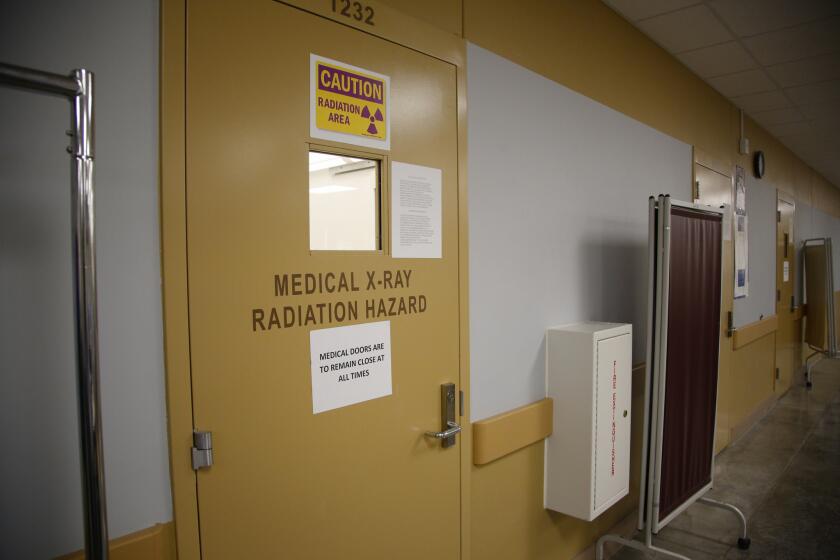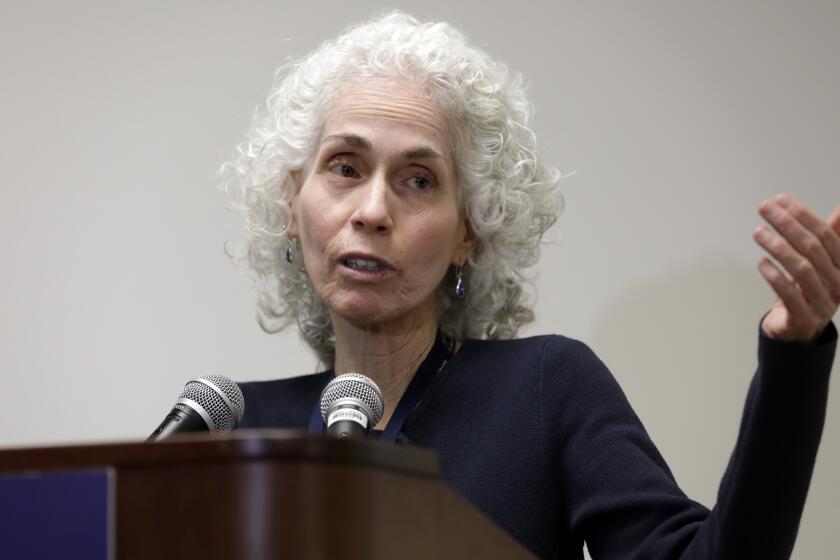Feds’ stockpile for coronavirus response is exhausted, amid questions about how supplies were distributed
- Share via
As the Trump administration depleted the national stockpile of medical supplies over the last month to fight the coronavirus, it sent hundreds of thousands of masks, respirators and other protective equipment to states with very small outbreaks, new records show.
That left medical workers in areas hit hardest by the pandemic, including New York, New Jersey, Michigan and Washington, hustling to find the supplies they needed with relatively little aid from the stockpile. Yet Hawaii, Montana and Nebraska, which each have had fewer than 500 recorded cases, each received more than 79,000 of the critically needed N95 masks.
The distribution of scarce medical equipment has emerged as a key point of controversy in the administration’s response, as states have been left to scramble on their own to get what they need. The Federal Emergency Management Agency and the Department of Health and Human Services have refused to divulge details of what equipment was going to what states.
Government officials told The Times that FEMA and HHS considered the populations of states and major metropolitan areas as well as the severity of the coronavirus outbreak in determining how to allocate supplies.
“HHS has deployed personal protective equipment from the [Strategic National Stockpile] to areas in need in the most equitable way for a nationwide response,” a spokesperson said. “The supplies, medicines and devices for lifesaving care contained in the stockpile can be used as a short-term, stopgap buffer.”
The new data — which were obtained and released by the House Committee on Oversight and Reform — show that larger states and cities did, in fact, receive more material than other places, if far from enough.
At least six ICE detainees and five facility employees at the Otay Mesa Detention Center have tested positive for the infection
Stricken areas, including New York City and Washington state, have also received supplemental shipments of equipment, the data show. California and Los Angeles County, each of which received allotments, together got 1,087,021 N-95 masks, second only to New York and New York City, which got 1,096,922 combined.
New York state and New York City, where hospitals have been struggling to keep up with the crush of infected patients, also received 4,400 ventilators, more than half of those distributed. California received 170.
Ventilators also went to some smaller states with very limited outbreaks, including Alaska and Oregon. Oregon received nearly as many devices, 140, as the 150 that went to Louisiana. Yet Louisiana had more than 16,000 confirmed cases of COVID-19, the disease caused by the coronavirus, according to the Centers for Disease Control and Prevention, while Oregon had 1,200.
A total 7,920 ventilators were sent from the stockpile, far fewer than experts say is needed nationwide. The administration is now contracting with manufacturers, including General Motors, to build more machines.
House Democrats said the federal government must take a more active role in ensuring states get the equipment they need, especially now that the stockpile has been depleted. “It appears the Administration is leaving states to fend for themselves,” Rep. Carolyn B. Maloney (D-N.Y.), chairwoman of the committee, said in a statement.
Trump and his top advisors said the government is working hard to obtain protective equipment, including by starting an “air bridge” of flights from China, where much of the needed gear is manufactured, to bring material to the United States.
Latinos make up a lower percentage of coronavirus deaths in L.A. County relative to their share of the population, according to preliminary data.
To date, the federal government mostly has been assailed for its lack of preparation and inadequate stores of protective gear. The newly released data are certain to raise additional questions of how the supplies have been doled out.
For example, New York has by far the largest outbreak of COVID-19, with more than 138,000 cases, according to CDC data. That is nearly 400 times more cases than in Hawaii, which had 362. Yet New York received only 12 times as many N95 masks as Hawaii.
FEMA did not respond to questions about the data Wednesday. Nor has the agency explained why it has not released information about where equipment from the stockpile has gone, despite repeated requests from The Times.
Distribution of material from the stockpile represents only one part of the federal government’s work on medical supplies. FEMA has also been working with other federal agencies to seize orders of medical equipment placed by hospitals, medical clinics and others, often expropriating the material without explanation.
The agency has declined to divulge where those orders are coming from or where they are going.
Get the L.A. Times Politics newsletter
Deeply reported insights into legislation, politics and policy from Sacramento, Washington and beyond. In your inbox twice per week.
You may occasionally receive promotional content from the Los Angeles Times.








